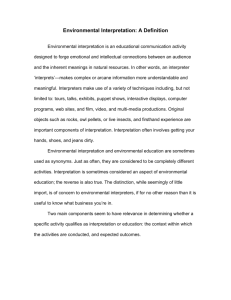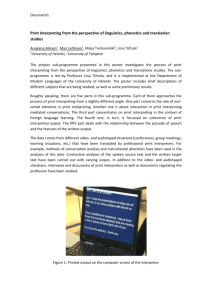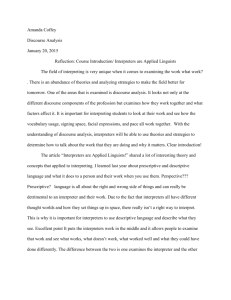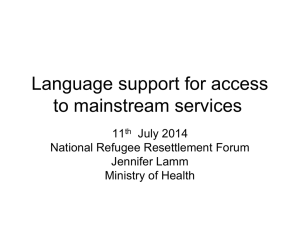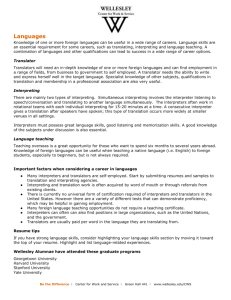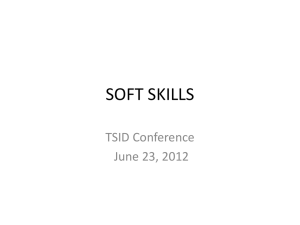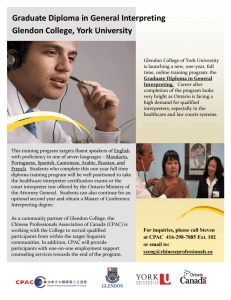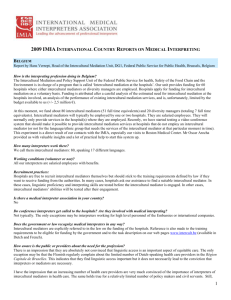The needs of a good interpreting service
advertisement
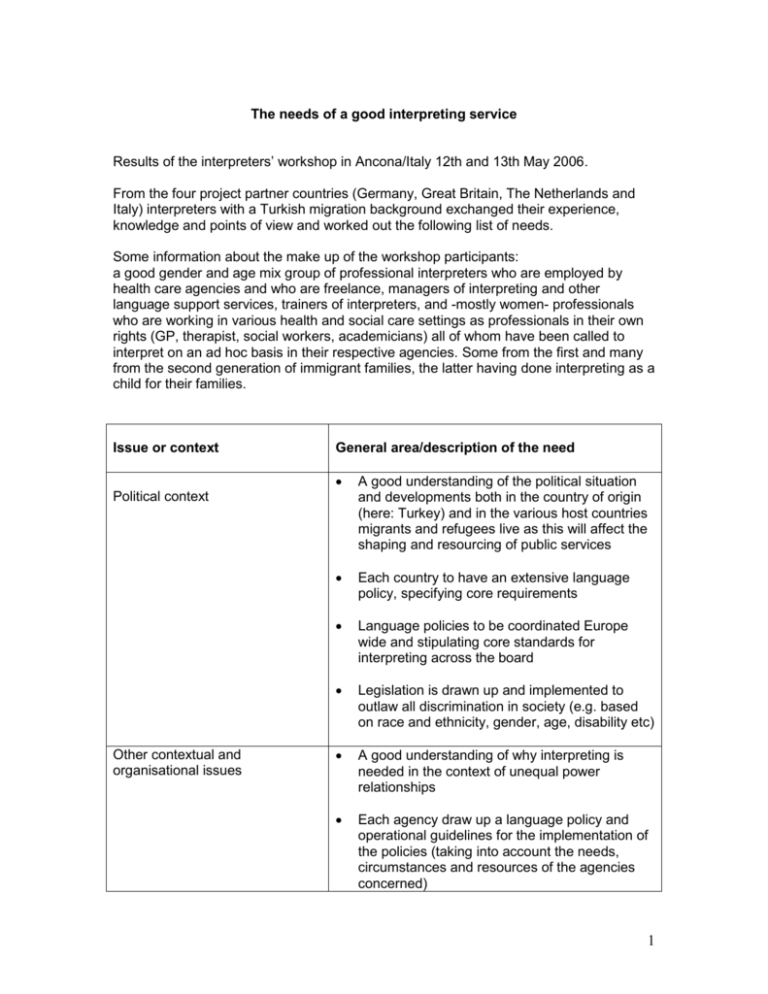
The needs of a good interpreting service Results of the interpreters’ workshop in Ancona/Italy 12th and 13th May 2006. From the four project partner countries (Germany, Great Britain, The Netherlands and Italy) interpreters with a Turkish migration background exchanged their experience, knowledge and points of view and worked out the following list of needs. Some information about the make up of the workshop participants: a good gender and age mix group of professional interpreters who are employed by health care agencies and who are freelance, managers of interpreting and other language support services, trainers of interpreters, and -mostly women- professionals who are working in various health and social care settings as professionals in their own rights (GP, therapist, social workers, academicians) all of whom have been called to interpret on an ad hoc basis in their respective agencies. Some from the first and many from the second generation of immigrant families, the latter having done interpreting as a child for their families. Issue or context General area/description of the need A good understanding of the political situation and developments both in the country of origin (here: Turkey) and in the various host countries migrants and refugees live as this will affect the shaping and resourcing of public services Each country to have an extensive language policy, specifying core requirements Language policies to be coordinated Europe wide and stipulating core standards for interpreting across the board Legislation is drawn up and implemented to outlaw all discrimination in society (e.g. based on race and ethnicity, gender, age, disability etc) A good understanding of why interpreting is needed in the context of unequal power relationships Each agency draw up a language policy and operational guidelines for the implementation of the policies (taking into account the needs, circumstances and resources of the agencies concerned) Political context Other contextual and organisational issues 1 Practical issues Through a series of quality standards, recognition and establishment of interpreting in health and social care settings as a profession in its own right (just as conference interpreting etc) and of interpreters as professionals (will raise the profile of the profession) Using children as interpreters should be forbidden in all public services A good understanding of practical issues in relation to interpreting and drawing up good, realistic and comprehensive operational guidelines to ensure efficient implementation of the language policies Managing patients’ as well as the service providers’ often unrealistic expectations regarding the role and abilities of the interpreter. Protecting and respecting the patients’ dignity at all times The model of the service should be considered carefully and it must be commensurate with the needs of all the people using it (E.g. face to face interpreting that includes gestures and other body language is more efficient than telephone interpreting in meeting the needs of the patients) Transparency: The issue of trust between the interpreter/client, client/service provider and service provider/interpreter needs to be well understood and established Independence of the interpreter and the interpreting service from the organisation/agency/service providers they work with Accountability of the interpreter and the interpreting service, especially in the situations where there is conflict between professional duties and conscience of the interpreter or where the expectations or interests of the clients conflict with those of the service providers The role of the interpreter needs to be clarified and well explained to all users of the interpreting 2 service: clients, their carers and the service providers Language issues Children must never be used as interpreters in health & social care and other public services as this raises a number of ethical issues for all concerned The role of the interpreter in achieving feedback and meeting quality standards of the services they work in (e.g. complaints) A good understanding of the continuum along which language support services are provided ranging from interpreting to bilingual advocacy A good understanding of the boundaries between the clients, y: often the interpreters have to set up/maintain the boundaries of a setting, establishing and maintaining professional boundaries A good understanding of the importance of structuring the interpreted interview, stipulating the issues and actions before, during and after the interview Establishing and working to quality marks and standards as professional interpreters Regulating pay, job descriptions and person specification of interpreters to recognise their professional value and role) A good understanding of the differences in and use of language – e.g. that being from the same country does not mean that people speak the same language: dialects, different languages and levels of education etc. play a significant role in interpreted communication; particularly people of the 2nd or 3rd generation may speak the language of the host country very well but their mother tongue can be relatively weak Ensuring that interpreters are competent in all the languages they use in their job as good 3 language skills are important for the accuracy of the interaction Training A good understanding that technical terminology used by health and social care providers (especially physicians) is not readily accessible to untrained interpreters and it cannot easily be simplified or transformed into daily language The advantages and disadvantages of working with ad hoc interpreters must be understood and considered well before they are introduced as rightful partners in the interpreted consultation Improving language skills and competence in both the mother tongue and target language/s Knowledge and confident, appropriate use of terminology and specialised jargon, again in mother tongue and target language Knowledge of the services where interpreting takes place Personal skills (e.g. setting and maintaining a professional relationship and boundaries, assertiveness, keeping confidentiality, good listening skills -particularly if working with mentally ill people) Learning to be confident enough to ask question Knowledge about the contexts, about the system of the country where your patient comes from, about the system where your patient comes from Attitudes: interpreters shall not look down on the patients. They shall be aware of prejudices Awareness of difference of gender in the interpreting settings Cultural issues (and at the same time, awareness of stereotypes: the individual patient should not disappear behind “culture”) 4 How a good interpreter should be Training is essential of all levels of service providers working with interpreters in multiethnic, multi-cultural settings Health professionals also have to be trained to be aware of their attitudes, of prejudices etc. A good interpreter: - Good command of both languages Not patronising Good awareness and understanding of both communities/cultures Over the age of 18 Not compromising confidentiality Aware of boundaries Aware of patients’ rights Open to education and training Sensitive, able to show empathy Non-judgemental, respecting clients’ personality Care about own appearance (including dress code) Observing work ethics and quality standards 5



